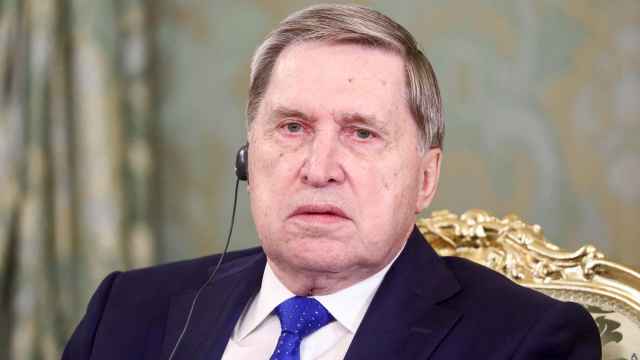NOVY URENGOI, Yamal-Nenets Autonomous District — The government is considering giving tax breaks to operators of offshore and liquefied natural gas projects in the Arctic as the country aims to produce 1 trillion cubic meters of the fuel by 2030.
"We may think of tax breaks for gas, for offshore and LNG," Prime Minister Vladimir Putin told reporters Monday after launching the third production phase at Novatek's Arctic Yurkharovskoye gas field.
"New projects are in the pipeline. First of all, we are talking about large-scale LNG production on Yamal," he added.
Novatek, the country's largest independent gas producer, is gearing up to develop the giant South Tambei fields in the remote Yamal-Nenets autonomous district to supply its LNG project, which would produce 16 million tons of LNG per year.
Putin also said Russian production from the Gazprom-led Sakhalin-2 LNG project accounted for 5 percent of the global LNG market but that the market would double by 2015.
"We need to take this trend into account," he said, adding that companies might raise output to 1 trillion cubic meters by 2030 from today's level of 650 billion cubic meters.
In line with this, Putin has ordered that the license for the Kharasavei gas field, also on the remote Yamal peninsula, be transferred to Gazprom, said Deputy Prime Minister Igor Sechin, the country's top energy official.
But Putin's vision of the country's growing production potential depends largely on a recovery in global demand and the extent to which shale gas and other unconventional gas developments make inroads in Russia's export markets.
Gas sales to Europe, Russia's historical export market, are seen staying flat at best in the near-to-mid term, and more countries are demanding a higher degree of spot-pricing elements in their contracts.
Meanwhile, energy-hungry China, which will receive 30 bcm of gas from its northern neighbor for 30 years beginning in 2015, may also start tapping domestic shale gas reserves, which analysts say could supply a quarter of its gas needs by 2030.
Russian gas producers say their investment programs will be hampered in the future by a proposed 61 percent increase in the mineral extraction tax for gas and the introduction of taxes on state-owned infrastructure, including pipelines.
Gazprom chief executive Alexei Miller said Monday during the meeting on Russia's gas strategy to 2030 that taken together, the tax hikes would cost the firm 200 billion rubles ($6.7 billion) over the next three years.
"I believe it would be a timely and correct decision to set the mineral extraction tax to zero for gas extraction in Yamal, and, by the looks of it, for deposits in East Siberia, the Far East and on the shelf," Miller said.
"We should also be considering lowering the export duty on gas produced from these regions."
Miller said the government proposal to apply a property tax to state-owned infrastructure such as pipelines would cost Gazprom an extra 29 billion rubles in 2012 and 57 billion rubles in 2013.
The Finance Ministry, battling a 5.9 budget deficit and inflation of 7 percent to 8 percent, drafted a bill in August that would require natural monopolies to pay a 1.1 percent property tax from 2012, raising it to 2.2 percent in 2013.
A Message from The Moscow Times:
Dear readers,
We are facing unprecedented challenges. Russia's Prosecutor General's Office has designated The Moscow Times as an "undesirable" organization, criminalizing our work and putting our staff at risk of prosecution. This follows our earlier unjust labeling as a "foreign agent."
These actions are direct attempts to silence independent journalism in Russia. The authorities claim our work "discredits the decisions of the Russian leadership." We see things differently: we strive to provide accurate, unbiased reporting on Russia.
We, the journalists of The Moscow Times, refuse to be silenced. But to continue our work, we need your help.
Your support, no matter how small, makes a world of difference. If you can, please support us monthly starting from just $2. It's quick to set up, and every contribution makes a significant impact.
By supporting The Moscow Times, you're defending open, independent journalism in the face of repression. Thank you for standing with us.
Remind me later.





